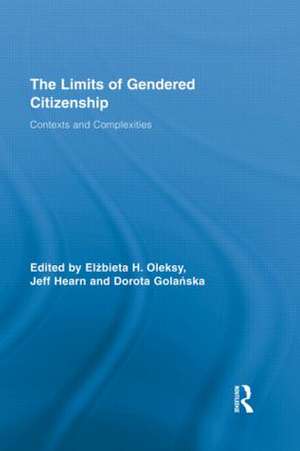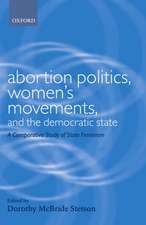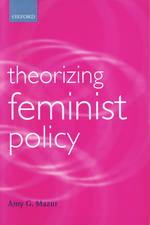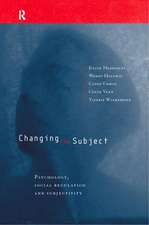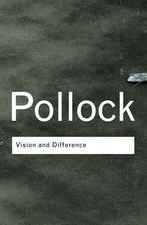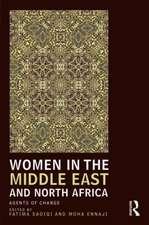The Limits of Gendered Citizenship: Contexts and Complexities: Routledge Advances in Feminist Studies and Intersectionality
Editat de Elżbieta H. Oleksy, Jeff Hearn, Dorota Golańskaen Limba Engleză Hardback – 14 dec 2010
| Toate formatele și edițiile | Preț | Express |
|---|---|---|
| Paperback (1) | 433.26 lei 43-57 zile | |
| Taylor & Francis – 5 iun 2013 | 433.26 lei 43-57 zile | |
| Hardback (1) | 1116.38 lei 43-57 zile | |
| Taylor & Francis – 14 dec 2010 | 1116.38 lei 43-57 zile |
Din seria Routledge Advances in Feminist Studies and Intersectionality
-
 Preț: 316.81 lei
Preț: 316.81 lei -
 Preț: 309.59 lei
Preț: 309.59 lei -
 Preț: 288.67 lei
Preț: 288.67 lei -
 Preț: 311.33 lei
Preț: 311.33 lei - 8%
 Preț: 388.40 lei
Preț: 388.40 lei - 5%
 Preț: 269.89 lei
Preț: 269.89 lei -
 Preț: 370.61 lei
Preț: 370.61 lei - 18%
 Preț: 1000.30 lei
Preț: 1000.30 lei -
 Preț: 433.26 lei
Preț: 433.26 lei - 26%
 Preț: 764.20 lei
Preț: 764.20 lei -
 Preț: 364.55 lei
Preț: 364.55 lei - 18%
 Preț: 1108.37 lei
Preț: 1108.37 lei -
 Preț: 367.83 lei
Preț: 367.83 lei -
 Preț: 416.22 lei
Preț: 416.22 lei - 18%
 Preț: 1113.60 lei
Preț: 1113.60 lei -
 Preț: 369.73 lei
Preț: 369.73 lei -
 Preț: 362.61 lei
Preț: 362.61 lei -
 Preț: 484.30 lei
Preț: 484.30 lei - 17%
 Preț: 244.91 lei
Preț: 244.91 lei -
 Preț: 416.22 lei
Preț: 416.22 lei -
 Preț: 478.71 lei
Preț: 478.71 lei - 18%
 Preț: 1002.36 lei
Preț: 1002.36 lei -
 Preț: 484.47 lei
Preț: 484.47 lei -
 Preț: 368.76 lei
Preț: 368.76 lei -
 Preț: 376.86 lei
Preț: 376.86 lei - 18%
 Preț: 1117.77 lei
Preț: 1117.77 lei - 18%
 Preț: 1055.51 lei
Preț: 1055.51 lei - 18%
 Preț: 1000.27 lei
Preț: 1000.27 lei -
 Preț: 389.38 lei
Preț: 389.38 lei -
 Preț: 486.38 lei
Preț: 486.38 lei -
 Preț: 369.73 lei
Preț: 369.73 lei -
 Preț: 381.62 lei
Preț: 381.62 lei - 18%
 Preț: 1000.27 lei
Preț: 1000.27 lei - 18%
 Preț: 1051.55 lei
Preț: 1051.55 lei
Preț: 1116.38 lei
Preț vechi: 1361.44 lei
-18% Nou
Puncte Express: 1675
Preț estimativ în valută:
213.62€ • 223.60$ • 177.80£
213.62€ • 223.60$ • 177.80£
Carte tipărită la comandă
Livrare economică 31 martie-14 aprilie
Preluare comenzi: 021 569.72.76
Specificații
ISBN-13: 9780415887069
ISBN-10: 0415887062
Pagini: 282
Ilustrații: 8 tables
Dimensiuni: 152 x 229 x 18 mm
Greutate: 0.45 kg
Ediția:1
Editura: Taylor & Francis
Colecția Routledge
Seria Routledge Advances in Feminist Studies and Intersectionality
Locul publicării:Oxford, United Kingdom
ISBN-10: 0415887062
Pagini: 282
Ilustrații: 8 tables
Dimensiuni: 152 x 229 x 18 mm
Greutate: 0.45 kg
Ediția:1
Editura: Taylor & Francis
Colecția Routledge
Seria Routledge Advances in Feminist Studies and Intersectionality
Locul publicării:Oxford, United Kingdom
Public țintă
Postgraduate and UndergraduateCuprins
1. Introduction: The Limits of Gendered Citizenship Jeff Hearn, Elżbieta H. Oleksy and Dorota Golańska Part 1: Supranational and European Contexts: New Political Agendas for Citizenship 2. From the Intimate to the Global: Reflections on Gendered Citizenship Ruth Lister 3. Towards Feminist Citizenship: Contentious Practices and European Challenges Emanuela Lombardo and Mieke Verloo 4. EU Gender Equality Policy: Citizens’ Rights and Women’s Duties Emanuela Lombardo and Petra Meier Part 2: The Nation-State in Regional Contexts: New Contradictions in Citizenship 5. Citizenship in the Newly Enlarged Europe: Contested Strategies of Achieving Gender Equality Noemi Kakucs 6. Equality Discourses at the Crossroads: Gender Equality versus Diversity Thorgerdur Thorvaldsdóttir and Thorgerdur Einarsdóttir 7. Introducing Transgender Citizenship: The UK Case Surya Monro 8. Comparative Studies of Well-Being in Terms of Gender, Ethnicity and the Concept of "Bodily Citizenship": Turning Esping-Andersen on His Head? Keith Pringle Part 3: Transnational and Migratory Contexts: New Cultural Spaces of Citizenship 9. Governing Muslim Headscarves: Regulations and Debates in Europe Siegelinde Rosenberger and Birgit Sauer 10. Negotiating Spaces of Participation: Experiences and Strategies of Skilled Immigrant Women Seeking Professional Integration Nadia Baghdadi and Yvonne Riaño 11. Ethnic Minority Women and Political Influence in Norway Line Nyhagen Predelli 12. "We Are Simply More Beautiful": Counter-Stories of Lithuanian Migrant Women in London Rasa Erentaite 13. Russian Women-Immigrants in the Nordic Countries: Finland, Norway, Sweden – Gender Perspective on Social Justice Jana Sverdljuk
Descriere
This collection responds to the need to re-evaluate the very important concept of citizenship in light of recent feminist debates. In contrast to the dominant universalizing concepts of citizenship, the volume argues that citizenship should be theorized on many different levels and in reference to diverse public and private contexts and experiences. The book seeks to demonstrate that the concept of citizenship needs to be understood from a gendered intersectional perspective and argues that, though it is often constructed in a universal way, it is not possible to interpret and indeed understand citizenship without situating it within a specific political, legal, cultural, social, and historical context.
